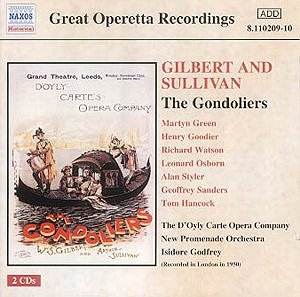This set is taken from 78 record matrices, which were
later released as Decca LPs, LK4008-9. These recordings are amongst
the last conventionally-cut 78rpm wax masters in the UK and were made
in 1950.
Arthur Sullivan had a reputation as Great Britain’s
most important composer of the Victorian age; having written theatre
music, symphony, oratorio and numerous songs and hymns. Sullivan received
a classical musical training, first as a chorister and later as student
at the Royal Academy of Music, London. A Mendelssohn scholarship took
him to Leipzig where he was immersed in the music of the German romantics.
As a composer he was skilled in providing catchy melodies, songs that
were well orchestrated and his art even led to the cultivation of a
new style of English operetta.
With witty lyrics, colourful music and memorable tunes
the Gilbert and Sullivan comic operas are a genre on their own. The
partnership between Gilbert and Sullivan was initiated by the enterprising
theatre manager, Richard D'Oyly Carte. Carte brought them together to
write fourteen comic operas, the twelfth of which was The Gondoliers.
The Gondoliers followed the immensely
successful Yeomen of the Guard. It ridicules republicanism, jokes
at private enterprise (still appropriate today) and wallows in the ignorance
of two humble gondoliers elevated to the ranks of royalty through a
mix up at birth.
The D'Oyly Carte Opera Company existed continuously
from 1877 until 1982 and had a reputation for long-serving singers of
good voice and excellent diction. The artists were often the focus of
interest and allegiance by the British public as was their dedication
to G&S. The singers here are those who delivered their roles on
stage and are thus memorable to D’Oyly Carte enthusiasts. There would
be practically no break between touring and the recording studio so
it is credit to them that they manage to retain a reasonable air of
freshness in the recording.
Muriel Harding (sop) is a confident Gianetta
and sings her role with innocent charm and confident legato, clearly
by now having overcome her nervousness in the Trial recording
of this series. Ella Halman with her plummy contralto voice is well
suited to the haughty Duchess and her delivery is strong. Leonard Osborn
(ten) (Marco), is a singer who is generally acceptable in this
series of recordings but has a nasal quality with unusual vibrato that
I do not find particularly elegant. He sings with a wide compass, but
is disappointing in Take a pair of Sparkling Eyes where pitching
is not always secure. He is upstaged by Alan Styler (bar) who
has a voice of more rounded tone, good diction, never sounds forced
and generally captivates interest. Styler’s rendering of Rising Early
in the Morning is everything it should be. Henry Goodier is unknown
to me and he must have been with the D’Oyly Carte for only a short period
of time. (He is not even given a biographical note in the CD booklet.)
With his thick baritone voice he does not seem comfortable in the role
of Luiz, and sometimes does not cleanly hit his top notes.
Martyn Green (bar), (Duke of Plaza Toro) played
the D’Oyly Carte patter roles from the Thirties, appeared in The
Mikado film of 1939 and continued through to the ’fifties. Always
a favourite in this role with those interested in the company’s history
his involvement will help CD sales. Of Richard Watson (bass)
(Don Alhambra), he successfully conveys the haughty air. He does this
particularly well but his high notes can be forced and the music rarely
allows him to use his lower more resonant notes.
In performing G&S, the tempi of Sullivan’s musical
numbers is all important. It has been shown time and time again that
when certain numbers are taken too slowly the melody is lost. Many conductors,
both professional and amateur, often fail to appreciate this. Isidore
Godfrey, D’Oyly Carte’s resident musical director for many decades,
seems to understand Sullivan’s music particularly well and in his many
Decca recordings over the decades the tempi are excellent. Here the
lively pace is particularly energetic and brisk (sometimes lacking in
the Sargent (EMI) equivalents). The early Decca operatic recordings
are noted for their small orchestras yet the playing is very acceptable,
but with a ‘theatre pit’ ambience. In this series of G&S recordings
there is a noticeable reduction in the strings section and the acoustics
are particularly boxy compared with the more spacious later Decca recordings
made at Watford Town Hall.
The Naxos notes gives the matrix numbers of the masters
but it is not made clear that they refer to 78rpm records. The recording
sessions were cut as 78 masters usually with two takes per side. Although
by 1949 the tape recorder had been invented, Decca did not rush to this
form of mastering, as tape reliability had not been fully tested. The
equalisation on this Naxos transcription is not good. There is considerable
gain in the treble and bass but the mid frequencies are attenuated and
reduce the intermediate harmonics. This gives the sound a somewhat brittle
quality as a result. The notes should have explained the important fact
that these recordings are mono. The notes give a synopsis of the opera
and biographical details of some of the singers but no background information
on the Savoy operas.
Raymond Walker
Other releases in this series are:–
The Gondoliers (1950): Pearl GEMS 0135; SoundsOnCD VGS 224
HMS Pinafore (1949): Naxos 8.110175; Pearl GEM 0096; SoundsOnCD
VGS 213
Pirates of Penzance (1949): Naxos 8.110196-97; Pearl GEMS 0097;
SoundsOnCD VGS 214
The Mikado (1950): Naxos 8.110176-77; Pearl GEMS 0134; SoundsOnCD
VGS 221; Regis RRC 2041


